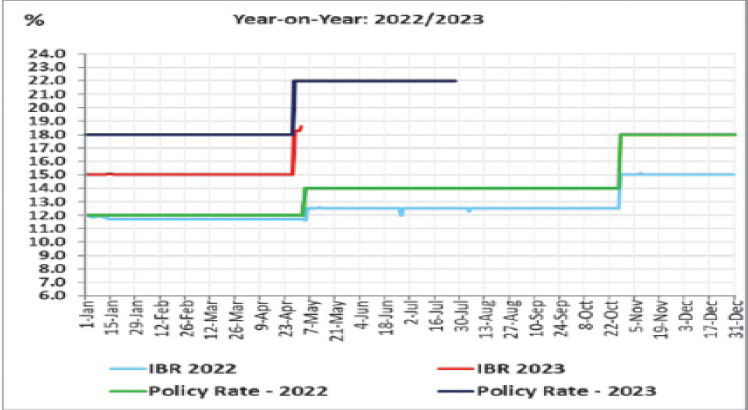Bank interest rate increase stirs panic
Commercial banks yesterday hiked their base lending rates to 20 percent in reaction to Reserve Bank of Malawi (RBM) hike in policy rate, a move that has stirred panic among consumers and businesses.
Published statements from banks show that the reference rate, an interest rate benchmark used to set other interest rates, has been increased from 17.3 percent to 20 percent.
This means that with the current reference rate, which forms part of interest rates charged by banks on loans, borrowers will now be paying between 22 percent and 33.5 percent for the loans.
In an interview yesterday, Malawi Confederation of Chambers of Commerce and Industry president Lekani Katandula, while indicating the move was anticipated, expressed fear that higher finance costs for business will slow down both investments and consumption.

He said: “The rising finance costs will, thus, slow down the appetite for business and all to borrow from the banks.
“We must also hope that government will also slow down on borrowing, otherwise a bigger government deficit will undermine the fight against inflation.”
Consumers Association of Malawi executive director John Kapito said yesterday that interest rates continue to bite consumers who are currently struggling to service loans and even borrow more to expand their businesses at a time the economic environment is hostile.
He said: “Our huge fear and concern as consumers is that this move will negatively affect productivity as industries will not borrow, which will shrink industrial activity and hurt ordinary Malawians.”
Chamber for Small and Medium Enterprises executive secretary James Chiutsi said increasing the cost of borrowing will dampen small businesses’ growth prospects.
“Access to finance will be limited and SMEs will be forced to raise prices of their products, leading to slower business growth,” he said.
Catholic University head of economics Hopkins Kawaye said rising lending rates will have an impact on borrowers and affect economic development.
He said: “The raise, therefore, makes it even harder to repay the loans but overall deters investment which may eventually affect national output.”
Banks’ published financial statements for the year ended December 2022 show that non-performing loans have been on the rise due to growth in the customer loan book, resulting in credit impairments.
In its published financial results for the period ended December 31 2022, Standard Bank plc indicated that credit impairments were up due to growth in the customer loan book.
Similarly, NBS Bank plc, FDH Bank plc and National Bank of Malawi plc also indicated that elevated interest rates increased credit impairments as loans and advances rose in the review period.
Meanwhile, Reserve Bank of Malawi (RBM) data shows that individual and household loans have been on the rise, accounting for the largest stock of outstanding private sector credit, claiming 34.3 percent of credit stock.
During the second Monetary Policy Committee (MPC) meeting last week, RBM Governor Wilson Banda justified the policy rate hike, saying inflation outlook had worsened since the last MPC meeting.





